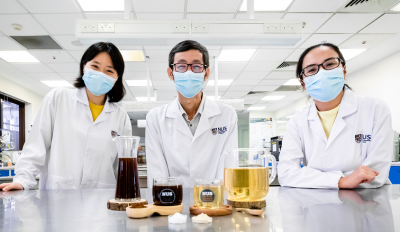Probiotics protection: Patented ‘Bac-in-a-box’ eyes growth in APAC markets

The technology, known as ‘Bac-in-a-box’ is developed by Singapore-based company Austrianova.
It uses a patented cellulose sulphate polymer to encapsulate beneficial bacteria into a small capsule the size of a granule.
The granules are then freeze-dried into powder, allowing the probiotics to survive even in room temperature and do not need to be transported and stored without using cold chain.
A recent study also found that the encapsulation could allow probiotics to survive the low pH stomach acid, and subsequently reach and be released in the lower intestine.
The encapsulation technology is not yet used in commercial products and the company said APAC would be one of its focuses as part of its wider market strategy.
Within the region, the technology is already patented in Singapore and Japan. A worldwide patent has also been filed.
“We are also looking at customers all over the world, but since we are located in Singapore, APAC is one of our focuses.
“In terms of world interest in probiotics, APAC is also a very important market,” CEO Brian Salmons told NutraIngredients-Asia.
The encapsulated probiotics will be made into freeze-dried powder, which can then be made into powder sachet, sprinkler, bottle top dispenser form.
100,000 times better
A study found that probiotics encapsulated with this technology could survive 100,000 times better than other forms of encapsulation.
The findings were recently published in Microbial Cell Factories.
Six commonly used probiotic strains and yeast were used in the study.
The probiotics strains used were Lactobacillus acidophilus (DMS 20079), Lactobacillus johnsonii (DMS 10533), Lactobacillus casei (DSM 20011), Bifidobacterium longum subsp. Infantis (B. infantis) (DMS 20088), and a genetically modified strain of Escherichia coli K12 MG1655.
The yeast used was the company’s in-house strain of Saccharomyces boulardii.
Results showed that the probiotic strains survived the encapsulation process with “good viability”, namely 60% to 70% for Lactobacillus acidophilus and Lactobacillus johnsonii, and 90% to 100% for Lactobacillus casei.
The researchers then tested the pH stability of the encapsulated probiotics by exposing it to artificial gastric juice for up to three hours.
Different probiotic strains have showed to survive the acidic gastric juice.
For instance, capsules containing Lactobacillus casei remained intact “with no deformation even at high magnifications”, said the researchers.
This is 10,000-fold better than chitosan encapsulation and 100,000-fold better than alginate plus gelatinised starch, they added.
“These results show that acid exposure even for 3 hours did not affect the integrity of the capsules,” they said.
However, Salmons said that the mechanisms behind how the encapsulation technology work was not yet fully understood.
Nonetheless, he said that the encapsulation technology would allow firms to use a reduce amount of the raw materials, including the probiotics, leading to cost efficiency.
The firm also developed a similar technology known as ‘Cell-in-a-box’ that allows cells to be implanted into the body and be protected from immune rejection.
Source: Microbial Cell Factories
Efficient protection of microorganisms for delivery to the intestinal tract by cellulose sulphate encapsulation
DOI: https://doi.org/10.1186/s12934-020-01465-3
Authors: Gunzburg, W.H., Aung, M.M., Toa, P. et al.



















